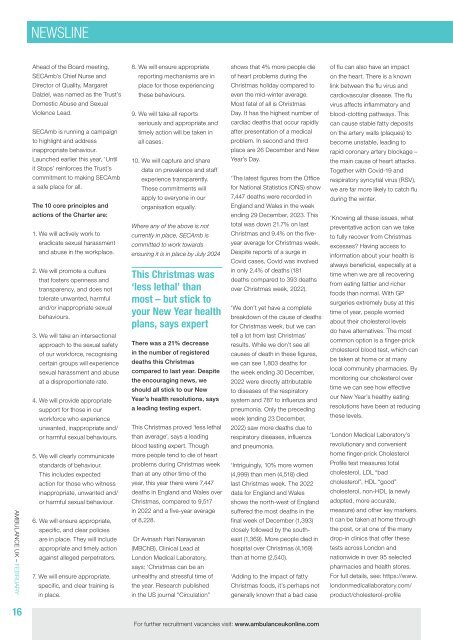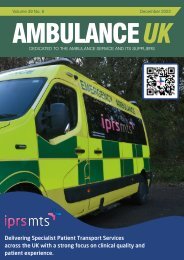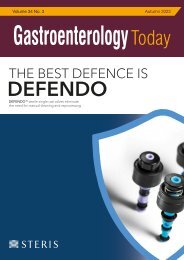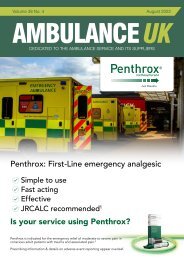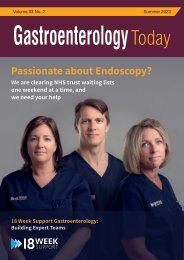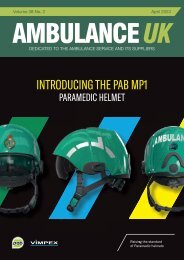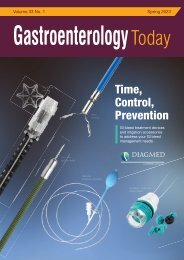Ambulance UK February 2024
Ambulance UK February 2024
Ambulance UK February 2024
You also want an ePaper? Increase the reach of your titles
YUMPU automatically turns print PDFs into web optimized ePapers that Google loves.
NEWSLINE<br />
NEWSLINE<br />
AMBULANCE <strong>UK</strong> – FEBRUARY<br />
Ahead of the Board meeting,<br />
SECAmb’s Chief Nurse and<br />
Director of Quality, Margaret<br />
Dalziel, was named as the Trust’s<br />
Domestic Abuse and Sexual<br />
Violence Lead.<br />
SECAmb is running a campaign<br />
to highlight and address<br />
inappropriate behaviour.<br />
Launched earlier this year, ‘Until<br />
it Stops’ reinforces the Trust’s<br />
commitment to making SECAmb<br />
a safe place for all.<br />
The 10 core principles and<br />
actions of the Charter are:<br />
1. We will actively work to<br />
eradicate sexual harassment<br />
and abuse in the workplace.<br />
2. We will promote a culture<br />
that fosters openness and<br />
transparency, and does not<br />
tolerate unwanted, harmful<br />
and/or inappropriate sexual<br />
behaviours.<br />
3. We will take an intersectional<br />
approach to the sexual safety<br />
of our workforce, recognising<br />
certain groups will experience<br />
sexual harassment and abuse<br />
at a disproportionate rate.<br />
4. We will provide appropriate<br />
support for those in our<br />
workforce who experience<br />
unwanted, inappropriate and/<br />
or harmful sexual behaviours.<br />
5. We will clearly communicate<br />
standards of behaviour.<br />
This includes expected<br />
action for those who witness<br />
inappropriate, unwanted and/<br />
or harmful sexual behaviour.<br />
6. We will ensure appropriate,<br />
specific, and clear policies<br />
are in place. They will include<br />
appropriate and timely action<br />
against alleged perpetrators.<br />
7. We will ensure appropriate,<br />
specific, and clear training is<br />
in place.<br />
8. We will ensure appropriate<br />
reporting mechanisms are in<br />
place for those experiencing<br />
these behaviours.<br />
9. We will take all reports<br />
seriously and appropriate and<br />
timely action will be taken in<br />
all cases.<br />
10. We will capture and share<br />
data on prevalence and staff<br />
experience transparently.<br />
These commitments will<br />
apply to everyone in our<br />
organisation equally.<br />
Where any of the above is not<br />
currently in place, SECAmb is<br />
committed to work towards<br />
ensuring it is in place by July <strong>2024</strong><br />
This Christmas was<br />
‘less lethal’ than<br />
most – but stick to<br />
your New Year health<br />
plans, says expert<br />
There was a 21% decrease<br />
in the number of registered<br />
deaths this Christmas<br />
compared to last year. Despite<br />
the encouraging news, we<br />
should all stick to our New<br />
Year’s health resolutions, says<br />
a leading testing expert.<br />
This Christmas proved ‘less lethal<br />
than average’, says a leading<br />
blood testing expert. Though<br />
more people tend to die of heart<br />
problems during Christmas week<br />
than at any other time of the<br />
year, this year there were 7,447<br />
deaths in England and Wales over<br />
Christmas, compared to 9,517<br />
in 2022 and a five-year average<br />
of 8,228.<br />
Dr Avinash Hari Narayanan<br />
(MBChB), Clinical Lead at<br />
London Medical Laboratory,<br />
says: ‘Christmas can be an<br />
unhealthy and stressful time of<br />
the year. Research published<br />
in the US journal “Circulation”<br />
shows that 4% more people die<br />
of heart problems during the<br />
Christmas holiday compared to<br />
even the mid-winter average.<br />
Most fatal of all is Christmas<br />
Day. It has the highest number of<br />
cardiac deaths that occur rapidly<br />
after presentation of a medical<br />
problem. In second and third<br />
place are 26 December and New<br />
Year’s Day.<br />
‘The latest figures from the Office<br />
for National Statistics (ONS) show<br />
7,447 deaths were recorded in<br />
England and Wales in the week<br />
ending 29 December, 2023. This<br />
total was down 21.7% on last<br />
Christmas and 9.4% on the fiveyear<br />
average for Christmas week.<br />
Despite reports of a surge in<br />
Covid cases, Covid was involved<br />
in only 2.4% of deaths (181<br />
deaths compared to 393 deaths<br />
over Christmas week, 2022).<br />
‘We don’t yet have a complete<br />
breakdown of the cause of deaths<br />
for Christmas week, but we can<br />
tell a lot from last Christmas’<br />
results. While we don’t see all<br />
causes of death in these figures,<br />
we can see 1,803 deaths for<br />
the week ending 30 December,<br />
2022 were directly attributable<br />
to diseases of the respiratory<br />
system and 787 to influenza and<br />
pneumonia. Only the preceding<br />
week (ending 23 December,<br />
2022) saw more deaths due to<br />
respiratory diseases, influenza<br />
and pneumonia.<br />
‘Intriguingly, 10% more women<br />
(4,999) than men (4,518) died<br />
last Christmas week. The 2022<br />
data for England and Wales<br />
shows the north-west of England<br />
suffered the most deaths in the<br />
final week of December (1,393)<br />
closely followed by the southeast<br />
(1,369). More people died in<br />
hospital over Christmas (4,169)<br />
than at home (2,540).<br />
‘Adding to the impact of fatty<br />
Christmas foods, it’s perhaps not<br />
generally known that a bad case<br />
of flu can also have an impact<br />
on the heart. There is a known<br />
link between the flu virus and<br />
cardiovascular disease. The flu<br />
virus affects inflammatory and<br />
blood-clotting pathways. This<br />
can cause stable fatty deposits<br />
on the artery walls (plaques) to<br />
become unstable, leading to<br />
rapid coronary artery blockage –<br />
the main cause of heart attacks.<br />
Together with Covid-19 and<br />
respiratory syncytial virus (RSV),<br />
we are far more likely to catch flu<br />
during the winter.<br />
‘Knowing all these issues, what<br />
preventative action can we take<br />
to fully recover from Christmas<br />
excesses? Having access to<br />
information about your health is<br />
always beneficial, especially at a<br />
time when we are all recovering<br />
from eating fattier and richer<br />
foods than normal. With GP<br />
surgeries extremely busy at this<br />
time of year, people worried<br />
about their cholesterol levels<br />
do have alternatives. The most<br />
common option is a finger-prick<br />
cholesterol blood test, which can<br />
be taken at home or at many<br />
local community pharmacies. By<br />
monitoring our cholesterol over<br />
time we can see how effective<br />
our New Year’s healthy eating<br />
resolutions have been at reducing<br />
these levels.<br />
‘London Medical Laboratory’s<br />
revolutionary and convenient<br />
home finger-prick Cholesterol<br />
Profile test measures total<br />
cholesterol, LDL “bad<br />
cholesterol”, HDL “good”<br />
cholesterol, non-HDL (a newly<br />
adopted, more accurate,<br />
measure) and other key markers.<br />
It can be taken at home through<br />
the post, or at one of the many<br />
drop-in clinics that offer these<br />
tests across London and<br />
nationwide in over 95 selected<br />
pharmacies and health stores.<br />
For full details, see: https://www.<br />
londonmedicallaboratory.com/<br />
product/cholesterol-profile<br />
Welsh <strong>Ambulance</strong><br />
Service using robots<br />
to byte down on<br />
repetitive tasks<br />
THE Welsh <strong>Ambulance</strong> Service<br />
is using robots to help run its<br />
behind-the-scenes operations.<br />
The Trust is using Robotic<br />
Process Automation (RPA)<br />
technology to perform timeconsuming<br />
administrative tasks<br />
to free up staff to focus on tasks<br />
that add the most value.<br />
The use of software robots, or<br />
‘digital workers,’ is saving time and<br />
allowing colleagues to harness<br />
their skills more appropriately.<br />
Jonny Sammut, the Trust’s<br />
Director of Digital, said: “It’s been<br />
a long-held ambition to use RPA<br />
technology, so we’re thrilled to be<br />
taking our first steps into it.<br />
proactmedical.co.uk<br />
“This is not about replacing<br />
humans with robots – it’s about<br />
automating those repetitive and<br />
low-value tasks so that staff can<br />
focus their skill and expertise on<br />
the things that really matter.<br />
“While the corporate staff who<br />
perform these tasks aren’t<br />
patient-facing, they support<br />
those who are, and anything<br />
which improves our efficiency<br />
behind-the-scenes means that<br />
patients will eventually reap the<br />
benefit too.”<br />
The Trust secured funding from<br />
Welsh Government’s Digital<br />
Priorities Investment Fund in<br />
March 2022 to explore RPA<br />
technology.<br />
To date, it has been used across<br />
five separate projects, including a<br />
project to streamline the creation<br />
of ICT accounts for new recruits.<br />
Almost 900 accounts have been<br />
created robotically since October<br />
2022, freeing up ICT analysts to<br />
apply their technical expertise to<br />
more complex issues.<br />
The technology is also being<br />
used by the team who produce<br />
investigation reports in response<br />
to complaints, inquests and<br />
serious incidents.<br />
A once-manual trawl of logs<br />
to establish a timeline of what<br />
happened has been replaced by<br />
an automatic process, increasing<br />
the capacity of the team by an<br />
average 36 hours per week and<br />
allowing investigating officers<br />
to focus on tasks where human<br />
judgement is essential.<br />
Leanne Smith, Assistant Director<br />
of Digital Services, said: “Taking<br />
away the pain of repetitive,<br />
laborious tasks to enable our<br />
people to use their knowledge<br />
and expertise on high-value tasks<br />
It’s time to choose accuracy.<br />
Not just a Pulse Oximeter.<br />
is what this is all about.<br />
“This is our first foray into<br />
automation but already<br />
colleagues are saying that<br />
it’s improving the workplace<br />
experience and boosting morale.<br />
“It’s an exciting time, and we<br />
look forward to scaling up in the<br />
coming years.”<br />
Meanwhile, the Trust is<br />
collaborating with the University<br />
of York to train the next<br />
generation of artificial intelligence<br />
(AI) professionals.<br />
The <strong>UK</strong>RI AI Centre for Doctoral<br />
Training (CDT) in Lifelong Safety<br />
Assurance of AI-Enabled<br />
Autonomous Systems (SAINTS)<br />
will welcome its first students<br />
next year.<br />
Nigel Rees, Assistant Director<br />
of Research and Innovation at<br />
the Welsh <strong>Ambulance</strong> Service,<br />
CLASS IIB<br />
MEDICAL DEVICE<br />
AMBULANCE <strong>UK</strong> – FEBRUARY<br />
16<br />
17<br />
For further recruitment vacancies visit: www.ambulanceukonline.com<br />
For further recruitment vacancies visit: www.ambulanceukonline.com


